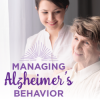When individuals develop Alzheimer’s disease, their loved ones often seek the assistance of professional caregivers. These professionals may provide in-home care, or work in memory care units of senior living communities. One of the biggest parts of being a caregiver, whether you are a professional or a family member, is to learn how to help residents manage their disease. Read on to learn what Alzheimer’s behaviors are and how you can provide assistance.
What is Alzheimer’s behavior?
When you think of the word Alzheimer’s, what comes to mind? Memory loss, wandering, and confusion are likely on your list. These common symptoms aren’t the only signs of this form of dementia. The Alzheimer’s Association shared the following Alzheimer’s behaviors:
- Seniors may become aggressive, enter into physical altercations with their caregivers while receiving assistance or even throw tantrums.
- Alzheimer’s patients may become agitated with no apparent stimuli. Little things like the inability to find their keys or not liking what’s on the lunch menu may send them into an angry frenzy.
- Hallucinations may occur in individuals who have this form of memory loss. They may think they have visited with a friend, for example, but that friend has long since passed away or did not speak to the person that day.
- It’s also common for seniors who have Alzheimer’s to become suspicious. They may think caregivers or senior living community staff are stealing their things, or even suspect that ghosts are moving their belongings around in the night.
- You’ll likely find that your loved one who has Alzheimer’s has trouble sleeping. He or she may nap for hours during the day and then be awake for long periods at night.
- He or she may repeat words or phrases as if they were never said in the first place.
How can caregivers help?
Caregivers provide crucial assistance to these individuals who require specialized help. It’s important to understand why individuals exhibit these behaviors so you can prevent some of them from occurring. For example, if there are specific happenings or items that trigger agitation or aggressiveness, avoid them. As for hallucinations, however, there isn’t much you can do. Some seniors may experience fewer hallucinations with an adjustment of any medications they are taking that have these side effects. Talk with the senior’s family or doctor to make sure his or her prescriptions are not having adverse effects.
Suspicion can be averted with some key security moves. For example, a senior woman who is constantly worried about her purse may feel better locking it in a safe every night. She can wear the key on a necklace to ensure she always has access, or give it to a trusted individual for safekeeping. Sleep issues can be mitigated with scheduled bedtimes and wakeup calls. Medications may also add to sleeplessness or drowsiness, so ask the person’s physician about these potential side effects as well. Repetition occurs because the senior has forgotten he or she already said something. You’ll have to simply have patience and wait this out, or change the subject with an interruptive question. Seniors deserve respect, so make sure the individual feels that you are listening even if it’s the third time you’ve heard a story today.
If you found an error, highlight it and press Shift + Enter or click here to inform us.



